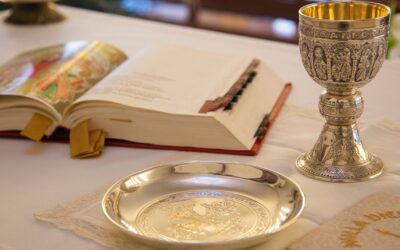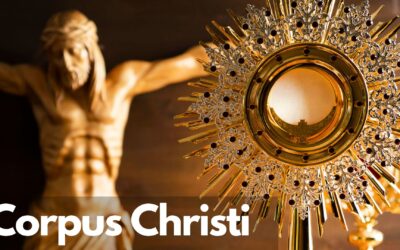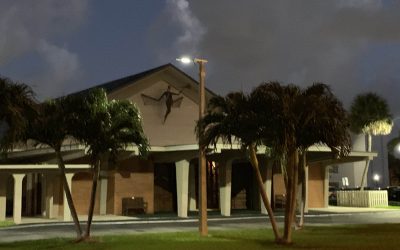Father Nathan Homily | August 16, 2020
Father Nathan | Homily
Today’s Readings for Mass During the Day:
First Reading — IS 56:1, 6-7
Second Reading — 1 Kings 19:9A, 11-13
Responsorial Psalm — PS 67:2-3, 5, 6, 8
O God, let all the nations praise you!
Second Reading — ROM 11:13-15, 29-32
Gospel Reading — MT 15:21-28
“Woman, great is your Faith! Let it be done for you as you wish.”
In today’s gospel, we meet a pagan woman who had the most extraordinary faith in Jesus, a faith that was rewarded with the cure of her sick daughter.
The gospel story is a strange one, and yet it is one that all of us are familiar with. It involves an encounter with a beggar.
True, the Canaanite woman was not begging for money. But she was begging, begging for a favor. At one time or another, all of us have been approached by a beggar, either at our doorstep or on a public street. One wonders how Jesus would deal with these kinds of situations.
One day, it seems, a certain curious person in heaven asked St. Peter “How many Hindus are in heaven?” Peter replied: “No Hindus”. Then he asked: “How many Muslims?” “Not even one,” replied Peter. The man was surprised. He said: “Oh, then, there are only Christians in heaven?” “No, there are no Christians in heaven either,” replied Peter. “How Many Catholics?” “No, Catholics either.” Then St. Peter said, “Heaven is not meant for any particular group of people. Here, there is no distinction between Hindus, Muslims or Christians for all are welcome in Heaven.”
The significance of the miracle is extremely beautiful and universal: The Gospels describe only two miraculous healings Jesus performed for Gentiles: the healing of the centurion’s servant (Mt 8:10-12) in Capernaum and the healing of the daughter of the Canaanite woman which we hear today.
Healing of the Canaanite Women’s Daughter
The encounter with the Canaanite woman took place outside Jewish territory in Tyre and Sidon. The woman in today’s miracle belonged to the old Canaanite stock of the Syro-Phoenician race. The Canaanites were the ancestral enemies of the Jews and were regarded as pagans and idolaters and, hence, as ritually unclean. But this woman showed
“a gallant and an audacious love which grew until it worshipped at the feet of the Divine, an indomitable persistence springing from an unconquerable hope, a cheerfulness which would not be dismayed” (Fr. James Rowland).
By granting the persistent request of the pagan woman, Jesus demonstrates that his mission is to break down the barriers and to remove the long-standing walls of division and mutual prejudice between the Jews and the Gentiles. God does not discriminate but welcomes all who believe in Him, who ask for His mercy and who try to do His will.
Jesus first ignores both the persistent cry of the woman and the impatience of his disciples to send the woman away. He then tries to awaken true Faith in the heart of this woman by an indirect refusal, telling her,
“I was sent only to the lost sheep of the house of Israel.” But the woman is persistent in her request. She kneels before him and begs, “Lord, help me.” Now Jesus makes a seemingly harsh statement, “It is not fair to take the children’s food and throw it to the dogs.”
The term “dogs” was a derogatory Jewish word for the Gentiles. Dogs were regarded by the Jews as unclean, because they would eat anything given to them, including pork. The woman noticed, however, that Jesus had used the word kunariois–the word for household pets – rather than the ordinary Greek word for dogs – kuon. She also observed that Jesus had used the word for dogs in a challenging way, urging her to answer in kind – a sort of test of the woman’s Faith. So, she immediately matched wits with Jesus.
Her argument runs like this: Pets are not outsiders but insiders. They not only belong to the family but are part of the family. While they do not have a seat at the table, they enjoy intimacy at the family’s feet. Hence, the woman replied:
“Yes, Lord, yet even the dogs eat the crumbs that fall from their master’s table!” (v. 27),
expressing her Faith that Jesus could and would heal her daughter. Jesus was completely won over by the depth of her faith, her confidence, and her wit and responded delightedly,
“Woman, great is your Faith! Let it be done for you as you wish.”
We notice that the woman was refused three times by Jesus before he granted her request; finally, at her the fourth attempt, Jesus rewarded her persistence, curing her daughter in answer to her plea. This Gospel episode is also an account of a woman who got more from the Kingdom of God than she had hoped for.
Have a Blessed Week,
Fr. Nathan
Join our Parish Family
Register in the parish, so that it’s easy to become a confirmation sponsor or Godparent.
Want to Lend a Helping Hand?
Find volunteer opportunities and share your talents.
Need a Helping Hand?
We are here to help. Request home visits, send a prayer request. For urgent needs call 954.943.3684
Set up Online Giving.
You can make a one-time donation or set up recurring gifts.
Past Messages from Father Nathan
From The Desk Of Father Nathan | July 06, 2025
St. Kateri Tekakwithathe first Native American to be recognized as a saint by the Catholic Church. Born in 1665 in a Mohawk village.
From The Desk Of Father Nathan | June 29, 2025
As we prepare to celebrate our nation’s Independence Day. Give thanks to God for our freedom. We remember with deep gratitude our Founding Fathers, the brave patriots, and all the visionary leaders …
From The Desk Of Father Nathan | June 15, 2025
According to Pope Leo XIV. To miss Mass without a reason is not a small matter. It is a mortal sin. Mass is the source and Summit of our life as Christians.
From The Desk Of Father Nathan | June 08, 2025
Understanding Why We Offer Masses for Our Intentions. Why? And for what? Are reasons to celebrate a Mass intention.
From The Desk Of Father Nathan | June 01, 2025
Solemnity of Corpus Christi – Focus on the Eucharist & the Real Presence of Christ. Eucharistic procession right after Saturday, June 21, vigil Mass.
From The Desk Of Father Nathan | May 25, 2025
St Gabriel Mural Project – A form of Evangelization – a mural can sow seeds of curiosity and reflection






